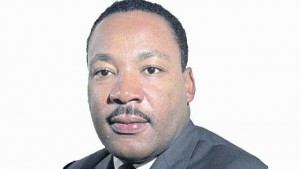
Martin Luther King Jr
AMERICA’S reflection yesterday on the life and work of the Reverend Dr Martin Luther King Jr came at a most fortuitous and important time, given recent events in that country.
Over the past few months, the United States — among the world’s most democratic countries and a proud defender of free speech — has been rocked by demonstrations against the killings of black, unarmed men by white police officers. The most recent is the revelation that North Miami Beach cops were using pictures of actual black teenagers in target practice.
The events are sad realities that America has to grapple with, as they revive the issue of race relations in a country that has made significant strides forward since the Jim Crow era that spawned the civil rights movement for which Dr King became a pivotal figure.
During last year’s observance of Martin Luther King Jr Day, we pointed out in this space that this iconic Baptist minister visited Jamaica in June 1965 and spoke at the University of the West Indies’ graduation ceremony and to the public at the National Stadium.
Here, in little Jamaica, an independent country for only three years, Dr King saw the freedom and racial equality he was fighting for in the US. So comfortable was he on that short visit that he returned in 1967 and rented a house where he completed the manuscript which became his most important book: Where Do We Go From Here?
We believe that Dr King chose Jamaica, not only because it provided an opportunity to reflect without distractions, but because his spirit and vision were inspired by this independent black country.
This opportunity to reflect came at a critical point in the direction of the civil rights movement and in Dr King’s own thinking and vision, which had broadened from his domestic concerns to human rights for mankind.
For Dr King had come to the realisation that there were commonalities between the issues in the United States and the rest of the world, so too Malcolm X after his trip to Africa. Indeed, Dr King expressed that global vision of interconnectedness as: “Injustice anywhere is a threat to justice everywhere.”
He had come to realise that securing the right to vote was the means to legal desegregation but not necessarily to economic segregation, which required employment and education.
We celebrate the life and achievements of Rev Dr King, who, through his commitment to non-violent protest, helped to change America for the better.
And even though Dr King suffered several periods of imprisonment and many incidents of violence, he gained the respect of the world with this defining statement: “The ultimate measure of a man is not where he stands in moments of comfort and convenience, but where he stands at times of challenge and controversy.”
As we have pointed out in this space before, there is a remarkable overlap of ideals between Jamaica’s first National Hero Marcus Garvey and Dr King in regard to the need for political freedom to be supported by economic development.
For both men recognised that, while it was important that the walls of segregation be demolished, there was also the need for those who were marginalised to enjoy the benefits of economic equality and independence.
One of the best tributes we could pay to both men is to ensure the preservation of that ideal.
